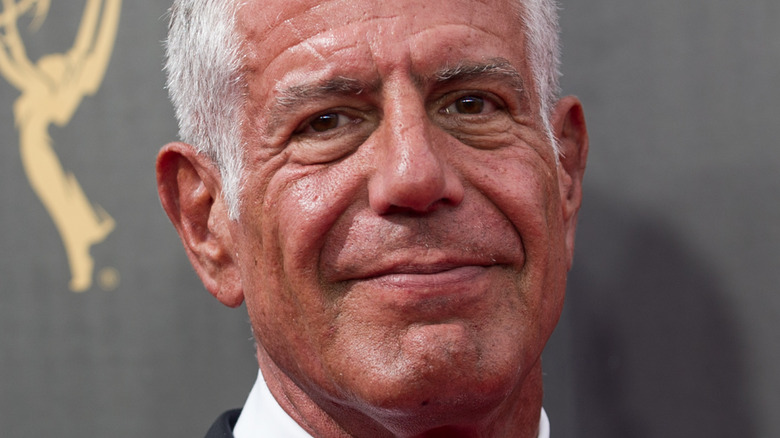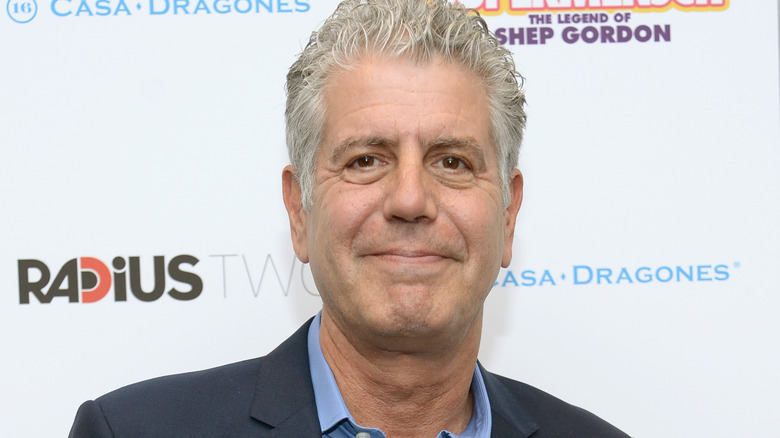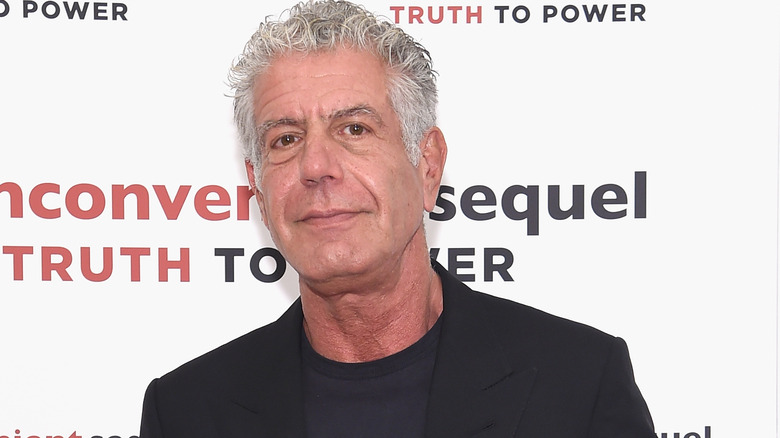The Tragic Effect Filming No Reservations Had On Anthony Bourdain
Fans of the late Anthony Bourdain — the former chef and longtime host of culinary travel shows including "Parts Unknown" and "No Reservations" — have been looking forward to mid-July's release of the documentary film about him, entitled "Roadrunner," since the movie was announced earlier this year. Directed by Oscar-winner Morgan Neville, the film promises to offer an intimate look at Bourdain's life and career, including some of the personal and professional struggles that may have contributed to the chef's untimely death by suicide at the age of 61.
With unprecedented access to hours of previously unreleased footage of Bourdain, "Roadrunner" includes scenes of the chef in conversation with his psychotherapist, according to The Takeout. In these scenes, Bourdain touches upon the difficulties of hosting "No Reservations" — the physical wear and tear of globetrotting across time zones, as well as the emotional challenges of filming in politically and socially unstable countries such as Lebanon, Haiti, and the Republic of Congo. Here's a look at the tragic impact filming his critically acclaimed show had on Bourdain's mental health.
Filming amid political and social strife took its toll
One of the most notable aspects of Anthony Bourdain's Travel Channel series "No Reservations" was its refusal to shy away from topics that would not typically be considered "entertainment." While many travel shows offer superficial looks at trendy locations, "No Reservations" often put its feet into the fire, filming in countries facing political or social strife (via The Takeout).
In 2006, for example, while filming an episode in Lebanon, war broke out between Israel and Hezbollah, the pro-Iran Shia militant group (via The Atlantic). According to the outlet, Bourdain had "come to Beirut to make a happy show about food and culture in a city that was regaining its reputation as the party capital of the Middle East. Instead, he found himself filming a country that had tipped into war overnight."
The cast and crew of "No Reservations" also had to contend with filming a show about food in impoverished locations deeply affected by hunger. In an interview with the Television Academy Foundation, Bourdain explained how the crew's attempt to do a good deed — buying out a restaurant they had filmed for the show in order to feed hungry locals — turned into a chaotic "Lord of the Flies"-type scene. "And as it happens, things spin immediately out of control," Bourdian recounted. "The bigger kids shove the smaller kids out of the way. The grownups, who were just as hungry, come in and shove the big kids out of the way. And pretty soon you have a riot."
Inside Anthony Bourdain's feelings of despair
While it's impossible to say exactly how the demands and pressures of his job affected Anthony Bourdain, scenes from the upcoming documentary "Roadrunner," filmed in conversation with Bourdain's therapist, show a dark, unsettled side of the chef and television host. He tells his therapist that he experiences rapid changes in mood, desiring to be happy and think that "everything is ok" but later experiencing feelings of wanting to harm himself or others (via The Takeout).
And according to The Takeout, things became darker in the last year of Bourdain's life. During the filming of the final episode of "Parts Unknown" in Alsace, France, where Bourdain later took his own life, episode director Tom Vitale tells "Roadrunner" director Morgan Neville he could see despair in Bourdain's eyes.
While parts of "Roadrunner" will undoubtedly be difficult viewing for Bourdain's many devoted fans and admirers, The Takeout notes that "there's plenty of joy in [the film] as well — a lot of it just from the pure pleasure of getting to see Bourdain again."
If you or someone you know is struggling with mental health, please contact the Crisis Text Line by texting HOME to 741741, call the National Alliance on Mental Illness helpline at 1-800-950-NAMI (6264), or visit the National Institute of Mental Health website.


